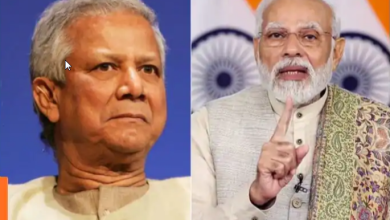Muslim leaders like Madni, Owaisi reject Uniform Civil Code as ‘Hindu Code’
 New Delhi: The president of Jamiat Ulama-i-Hind and a prominent voice in the Indian Muslim community, has staunchly opposed the Hinduization of Muslims in the garb of implementation of Uniform Civil Code (UCC) in India.
New Delhi: The president of Jamiat Ulama-i-Hind and a prominent voice in the Indian Muslim community, has staunchly opposed the Hinduization of Muslims in the garb of implementation of Uniform Civil Code (UCC) in India.
According to Kashmir Media Service, Madani’s declaration comes amidst ongoing debates surrounding the viability and implications of the UCC, particularly concerning its impact on religious minorities in India.
“Any law against Shariah is not acceptable for us,” Madani asserted, highlighting the deep-seated concerns within the Muslim community regarding the potential infringement upon their religious autonomy and customary practices.
 Asaduddin Owaisi, the head of the All India Majlis-e-Ittehad-ul-Muslimeen (AIMIM) and a member of parliament, has vehemently rejected the Uniform Civil Code (UCC) proposed by the BJP government in Uttar Pradesh Assembly, terming it as a “Hindu Code” and conflicting with the constitution. In a post on the social media platform, Owaisi stated that the Uniform Civil Code bill in Uttar Pradesh has been labeled as a Hindu Code, and it does not include mention of Hindu joint families. He questioned why Hindus were excluded if the government wants to enact a law on succession and inheritance.
Asaduddin Owaisi, the head of the All India Majlis-e-Ittehad-ul-Muslimeen (AIMIM) and a member of parliament, has vehemently rejected the Uniform Civil Code (UCC) proposed by the BJP government in Uttar Pradesh Assembly, terming it as a “Hindu Code” and conflicting with the constitution. In a post on the social media platform, Owaisi stated that the Uniform Civil Code bill in Uttar Pradesh has been labeled as a Hindu Code, and it does not include mention of Hindu joint families. He questioned why Hindus were excluded if the government wants to enact a law on succession and inheritance.
Owaisi emphasized that while the bill addresses polygamy, halala, and live-in relationships, it fails to address why Hindu joint families were exempted. It is noteworthy that the bill for the Uniform Civil Code was presented in the Uttar Pradesh Assembly on Wednesday, drawing strong objections from Muslim and other secular sections.
The Uniform Civil Code proposes a common set of laws governing various personal matters such as marriage, divorce, and inheritance across all religious communities in India. However, for Muslims, the implementation of such a code poses a direct challenge to Shariah law.
Shariah law governs numerous aspects of Muslim life, and any attempt to supersede it with a uniform code is perceived as an encroachment upon the religious rights and cultural identity of Indian Muslims.
Critics like Madani fear the imposition of majoritarian values and the marginalization of minority communities.








